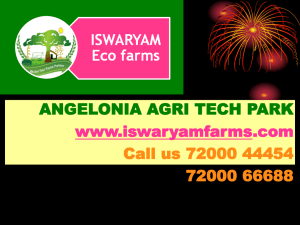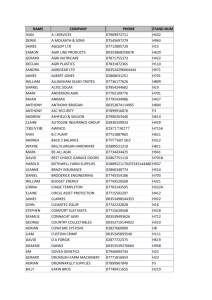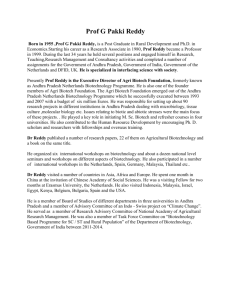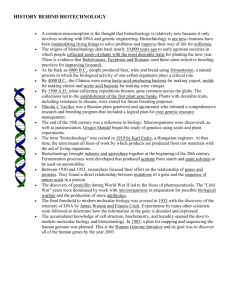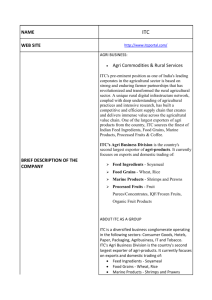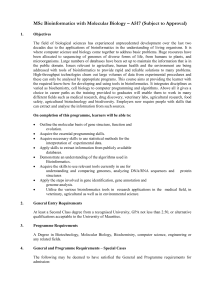BSc (Hons) Biotechnology – A325
advertisement
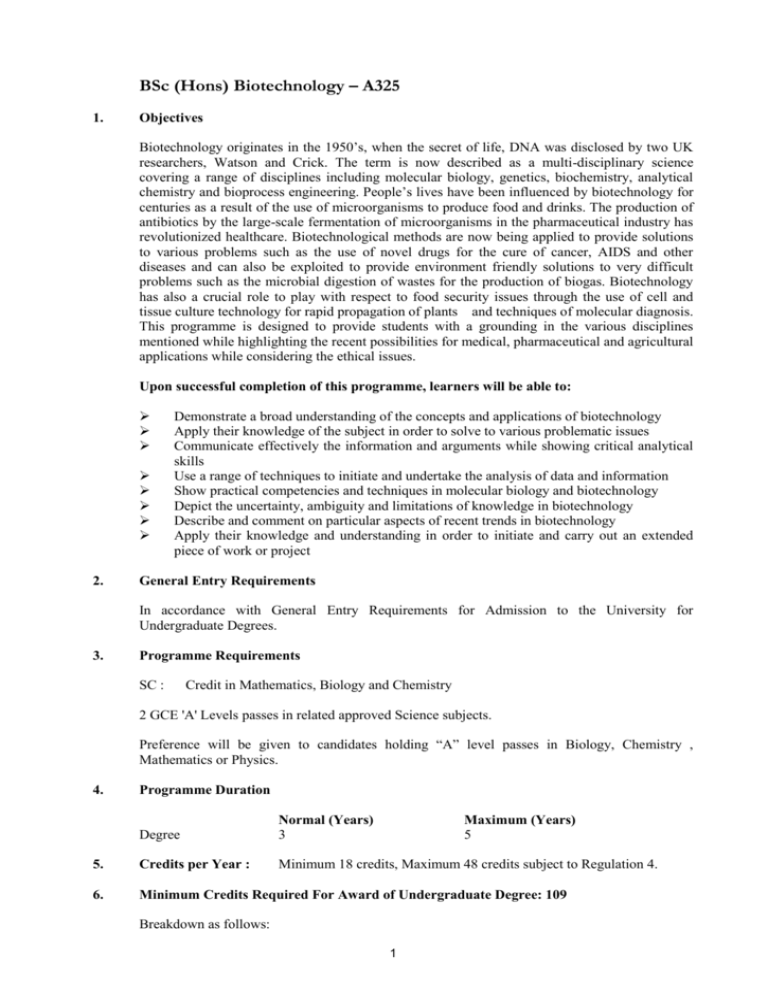
BSc (Hons) Biotechnology – A325 1. Objectives Biotechnology originates in the 1950’s, when the secret of life, DNA was disclosed by two UK researchers, Watson and Crick. The term is now described as a multi-disciplinary science covering a range of disciplines including molecular biology, genetics, biochemistry, analytical chemistry and bioprocess engineering. People’s lives have been influenced by biotechnology for centuries as a result of the use of microorganisms to produce food and drinks. The production of antibiotics by the large-scale fermentation of microorganisms in the pharmaceutical industry has revolutionized healthcare. Biotechnological methods are now being applied to provide solutions to various problems such as the use of novel drugs for the cure of cancer, AIDS and other diseases and can also be exploited to provide environment friendly solutions to very difficult problems such as the microbial digestion of wastes for the production of biogas. Biotechnology has also a crucial role to play with respect to food security issues through the use of cell and tissue culture technology for rapid propagation of plants and techniques of molecular diagnosis. This programme is designed to provide students with a grounding in the various disciplines mentioned while highlighting the recent possibilities for medical, pharmaceutical and agricultural applications while considering the ethical issues. Upon successful completion of this programme, learners will be able to: 2. Demonstrate a broad understanding of the concepts and applications of biotechnology Apply their knowledge of the subject in order to solve to various problematic issues Communicate effectively the information and arguments while showing critical analytical skills Use a range of techniques to initiate and undertake the analysis of data and information Show practical competencies and techniques in molecular biology and biotechnology Depict the uncertainty, ambiguity and limitations of knowledge in biotechnology Describe and comment on particular aspects of recent trends in biotechnology Apply their knowledge and understanding in order to initiate and carry out an extended piece of work or project General Entry Requirements In accordance with General Entry Requirements for Admission to the University for Undergraduate Degrees. 3. Programme Requirements SC : Credit in Mathematics, Biology and Chemistry 2 GCE 'A' Levels passes in related approved Science subjects. Preference will be given to candidates holding “A” level passes in Biology, Chemistry , Mathematics or Physics. 4. Programme Duration Degree Normal (Years) 3 Maximum (Years) 5 5. Credits per Year : Minimum 18 credits, Maximum 48 credits subject to Regulation 4. 6. Minimum Credits Required For Award of Undergraduate Degree: 109 Breakdown as follows: 1 Degree Core Taught Modules Project GEM 94 9 6 Practical Training and the Scientific Communication module must be completed satisfactorily for the award of the degree. Students may exit with (a) (b) 7. a Certificate after having earned 30 credits in core modules. a Diploma after having earned 60 credits in core modules. Assessment Each module will be assessed over 100 marks (i.e. expressed as %) with details as follows (unless otherwise specified). Assessment will be based on a Written Examination of 2 to 3 hour duration, carrying a weighting of 70%, and Continuous Assessment carrying 30% of total marks for AGRI modules. Modules from other Faculties/Departments/Centres will carry weighting in the Written Examination and the Continuous Assessment as specified by the concerned Faculties/Departments/Centres. Continuous Assessment will be based on laboratory/field works, and/or assignments, and shall include at least 1 class test. A minimum of at least 30% should be attained in each of Continuous Assessment and Written Examination, with an overall total of 40% for a candidate to pass a module. Modules will carry the weightings of 1, 3 or 5 depending on their status (Introductory, Intermediate or Advanced). Weighting for a particular module is indicated within parentheses in the module code. Each module will carry 6 credits, except for the following: COMS 1010(1), CSE 1010e(1) which will carry 3 credits and AGRI 7000 will carry 9 credits. Assessment of practical training will be based on the on-site supervisor’s evaluation and the student’s portfolio. For satisfactory completion of the practical training, a minimum of 40% should be attained. Assessment of the scientific communication module will be based on continuous assessment of students throughout the module and/or submission of a portfolio. For satisfactory completion of the module, a minimum of 40% should be attained. Written examinations for all AGRI modules will be carried out at the end of the academic year. 8. Important Note The rules as stipulated in this Programme Structure and Outline Syllabus will replace all other rules and regulations. 2 9. List of Modules CORE MODULES Module Code Module Name COMS 1010 (1) CSE 1010e (1) AGRI 1046Y(1) AGRI 1047Y(1) AGRI 1048Y(1) AGRI 1049Y(1) Communication Skills Introduction to Information Technology Chemistry Fundamentals & Biochemistry Microbiology & Genetics Cell Biology & Biotechnology Plant & Animal Science AGRI 2063Y(3) AGRI 2064Y(3) AGRI 2065Y(3) AGRI 2009Y(3) AGRI 2066Y(3) AGRI 2067Y(3) AGRI 2000Y (3) Statistics and Computational biology Biochemistry II & Human Physiology Molecular Biology Cell & Tissue Culture Immunology & Molecular Pathology Industrial & Environmental Biotechnology Practical Training 60+60 60+60 60+60 60+60 60+60 60+45 6 6 6 6 6 5 AGRI 3000Y (5) AGRI 3005Y (5) AGRI 3065Y(5) AGRI 3066Y(5) AGRI 3067Y(5) Project GMOs, Biosafety & Bioethics Genomics & Proteomics Plant Biotechnology Biotechnology for Medical and Veterinary applications. Bioinformatics Scientific Communication 60+60 60+60 60+60 9 6 6 6 60+60 45+60 20+0 6 5 - AGRI 3068Y(5) AGRI 3100 Hr / Yr L+P 45+0 45+0 60+60 60+60 60+60 60+60 Credits 3 3 6 6 6 6 AGRI2000 - Practical Training can be undertaken in either Year 1 or Year 2 GEMS 2 modules TOTAL NUMBER OF CREDITS: 10. 6 109 Programme Plan – BSc (Hons) Biotechnology CORE MODULES YEAR 1 Module Code Module Name COMS 1010 (1) CSE 1010e (1) AGRI 1046Y(1) AGRI 1047Y(1) AGRI 1048Y(1) AGRI 1049Y(1) Communication Skills Introduction to Information Technology Chemistry Fundamentals & Biochemistry Microbiology & Genetics Cell Biology & Biotechnology Plant & Animal Science Hr / Yr L+P 45+0 45+0 60+60 60+60 60+60 60+60 Credits Hr / Yr L+P 60+60 60+60 60+60 60+60 Credits 3 3 6 6 6 6 YEAR 2 Module Code AGRI 2063Y(3) AGRI 2064Y(3) AGRI 2065Y(3) AGRI 2009Y(3) Module Name Statistics and Computational biology Biochemistry II & Human Physiology Molecular Biology Cell & Tissue Culture 3 6 6 6 6 AGRI 2066Y(3) AGRI 2067Y(3) AGRI 2000Y (3) Immunology & Molecular Pathology Industrial & Environmental Biotechnology Practical Training Module Code Module Name 60+60 60+45 6 5 YEAR 3 CORE AGRI 3000Y (5) AGRI 3005Y (5) AGRI 3065Y(5) AGRI 3066Y(5) AGRI 3067Y(5) AGRI 3068Y(5) AGRI 3100 Hr / Yr L+P Project GMOs, Biosafety & Bioethics Genomics & Proteomics Plant Biotechnology Biotechnology for Medical and Veterinary applications Bioinformatics Scientific Communication Credits 60+60 60+60 60+60 9 6 6 6 60+60 45+60 20+0 6 5 Total number of credits: 109 11. Outline Syllabus COMS 1010 (1) - COMMUNICATION SKILLS (DE) Theory and models of communication. Effective use of English. presentation. Communication flow in organisations. Using media. Written communication. Oral CSE 1010e (1) - INTRODUCTION TO INFORMATION TECHNOLOGY (OE) Introduction to computers. Hardware and Software. Input/output devices and storage. Introduction to word processing. Introduction to systems analysis design. Introduction to spreadsheets. Organisation of data. Data communications and emerging applications. Workplace issues and your future in computing. AGRI 1046Y(1) - CHEMISTRY FUNDAMENTALS AND BIOCHEMISTRY Basics of organic, inorganic and physical chemistry. Structures of atoms, molecules, bonding, orbitals. Reactions and stoichiometry. Reaction rates and equilibrium. Acid/base redox reactions. Isomerism. Stereochemistry. Free radicals. Electrophilic, nucleophilic reactions. Spectroscopic techniques. Structures of biomolecules. Lipids, carbohydrates, proteins and nucleic acids. Biochemical calculations. AGRI 1047Y(1) - MICROBIOLOGY & GENETICS Microbial diversity, structures and functions. Microbial physiology. Growth and survival of microorganisms. Control of microorganisms. Importance of microorganisms. Disease-causing microorganisms. Prevention of microbial contamination. Factors affecting microbial growth. Laboratory techniques in culturing, staining and quantification of microorganisms. New technologies in the detection of micro-organisms. Mendelian inheritance. Linkage & chromosome mapping. Sex linked and extranuclear inheritance. Quantitative and population genetics. AGRI 1048Y(1) - CELL BIOLOGY AND BIOTECHNOLOGY Introduction to cell structure, Diversity of the genome, Cellular organizations, Cell membrane structure and membrane transport, Intracellular compartments and transport, Cell division and the cell cycle, Cell cycle control, Cell death, Cells in their social context. Introduction to biotechnology. Traditional & modern biotechnology. Basic concepts in Biotechnology. Scope and applications of biotechnology in health care, agriculture, environment. Biodiversity & its conservation. AGRI 1049Y(1) - PLANT & ANIMAL SCIENCE Plant anatomy and structure. Basics of taxonomy. Plant diversity. Economically important plant species. Plant growth and development. Plant physiology and reproductive biology. Environmental influences on growth and development. Plant nutrition. Growth analysis and yield determinants. Introductory plant breeding. Plant diseases & control. Structure and Anatomy (digestive, reproductive 4 and mammary gland) of non ruminant & ruminant animals. Reproductive physiology of animals. Principles of nutritional physiology and biochemistry of animals. Animal diseases and control. AGRI 2063Y(3) - STATISTICS & COMPUTATIONAL BIOLOGY Introducing statistics in biotechnology. Descriptive statistics – displaying and summarising data. Probability distributions. Point and interval estimation. Hypothesis testing. Analysis of categorical data. Correlation and regression analysis. Design and analysis of experiments. Data entry and analysis using EXCEL and MINITAB. Elements of research methodology. Sampling methods. Questionnaire development, design and administration. Data coding and processing using SPSS. Programming in Python: Basic Commands, Flow Control, Input/Output, Files, Modules, Regular Expressions Lists. Storing Amino Acids, Genes and Protein Information. Pattern Matching. AGRI 2064Y(3) - BIOCHEMISTRY 2 & HUMAN PHYSIOLOGY Protein biochemistry; structures and conformation of proteins. Peptide bonds. Ramachandran plot. Protein synthesis and purification methods. Analytical methods. Enzymes: mechanisms of reaction. Regulatory mechanisms. Protein databases. Metabolic pathways: carbohydrate, lipids and amino acids metabolism. Signal transduction. Cell cycle regulation. Programmed cell death and caspases. Plant biochemistry. Clinical biochemistry. An understaning of how the systems function: Circulatory system, Respiratory System, Nervous and Endocrine Systems, Sensory Structures, Excretory and Reproductive system AGRI 2065Y(3) - MOLECULAR BIOLOGY Prokaryotic and Eukaryotic genome, Mechanism of genetic exchange, Structure and properties of DNA. Recombination. DNA repair. Mutation and mutagenesis, Gene regulation and gene expression. Protein synthesis. Techniques of DNA analysis. Recombinant DNA technology. AGRI 2009Y(3)- CELL & TISSUE CULTURE Principles of plant micropropagation. The totipotency concept. Role & composition of plant tissue culture media. Micropropagation pathways. Callus induction & culture. Meristem culture. Haploid production. Cryopreservation & germplasm storage. Artificial seed technology. Embryo rescue. Protoplast culture & somatic hybridization. Variation in plant tissue cultures. Animal cell culture techniques & applications. AGRI 2066Y(3)- IMMUNOLOGY AND MOLECULAR PATHOLOGY Components of immune system; cells, organs, soluble mediators; humoral and cell-mediated immunity, Immunoglobulins; cell differentiation; complement system; inflammation. Immunity to bacterial, viral and fungal pathogens. Escape mechanisms. Immunological tolerance. Autoimmunity. Genomics of bacterial, viral pathogens in humans, animals and plants. Molecular basis of virulence; Virology : classes;genome organisation of viruses; Bacterial genomics. pathogen genetic diversity; strain differentiation; receptors for pathogen invasion. Drug resistance. AGRI 2067Y(3)- INDUSTRIAL & ENVIRONMENTAL BIOTECHNOLOGY Fermentation Technology, Bioreactor design and operation, media composition, gas exchange and mass transfer, sterilization, bioreactor scale-up. Process engineering and instrumentation. Production and commercial applications of industrial products including amino and organic acids, biodegradable polymers and antibiotics. Biofuels, biotransformation and biosensors. Downstream processing and product purification. Bioremediation; hydrocarbon-oxidising microorganisms, biosurfactants, removal of organic and metallic pollutants from soil. Biodesulphurisation, Biosensors in environmental applications. The emerging roles of GMOs; The plastics dilemma and biodegradable plastics; Microbes in clean production technology. AGRI 3000Y(5)-PROJECT This is a very important component of the programme, allowing students to develop high level skills and cognitive abilities. Every student will be allocated a research topic and the research work will be carried out under supervision. The student will have to submit a dissertation not exceeding 40 pages from “Introduction to “ Conclusion”. Students should demonstrate good practice in sing skills and knowledge acquired and follow guidelines as laid down. AGRI 3005Y(5)- GMOs, BIOSAFETY & BIOETHICS 5 Ethical issues in biotechnology. Biosafety & risk assessment of GMOs. Public perception. IPR & Trade related aspects. Methods for producing transgenic plants & animals. Important genes of agronomic interest. Current trends in finding useful genes. GMO Act 2004. Traceability. Legislative aspects. AGRI 3065Y(5)- GENOMICS AND PROTEOMICS Introduction to Genomics - information flow in biology, DNA sequence data, Experimental approach to genome sequence data, genome information resources. Comparative genomics .Functional Proteomics protein sequence and structural data, protein information resources and secondary data bases. Analysis of the transcriptome, Proteomics-Expression analysis. Characterization of proteins. High-throughput analysis of gene function - DNA microarrays, Protein arrays. Molecular markers. Small RNA’s. AGRI 3066Y(5)- PLANT BIOTECHNOLOGY Applications of plant biotechnology to crop improvement. Development & use of cell lines for specific disease, pest and stress resistance. Phytochemistry and secondary metabolites. Secondary product synthesis by plant tissue cultures. Elicitation & immobilisation. Hairy root cultures. Medicinal and aromatic plant biotechnology. Metabolomics & Systems biology. Commercial perspectives & future prospects. AGRI 3067Y(5) - BIOTECHNOLOGY FOR MEDICAL AND VETERINARY APPLICATIONS Nutrition ; dietetics; food composition; clinical dietary requirements; diabetes, obesity, diseases and nutritional deficiencies. Pathologic processes that underlie diseases; molecular basis of carcinogenesis; oncogenes. Gene therapy. Stem cell culture. Toxicology; animal health and disease. Vaccines. Molecular epidemiology. Molecular markers and diseases. Genetics of leukaemia. Gene expression studies: microarrays; Pharmacogenomics. Cryopreservation techniques, in vitro fertilization and embryo transfer, embryo split and nuclear transplantation. Identification and manipulation of genes. Marker assisted selection in animal breeding programmes (e.g selection against stress sensitive pigs). Transgenic animals with new traitsless fat, high growth rate, high ovulation rate (e.g Fecundin gene) transgenic animals as bioreactors for producing pharmaceutically important compounds and therapeutics. Disease diagnosis using DNA tools. Immunmodulation of animal castration and growth. AGRI 3068Y(5) - BIOINFORMATICS Internet basics, biological data analysis and application, sequence data bases. Sequence alignment & data base search. Protein primary sequence analysis, DNA sequence analysis, pair wise sequence alignment. FASTA and BLAST algorithm. Multiple sequence alignment. Database searching using BLAST and FASTA. Structural data bases. Algorithms used in bioinformatics (to be serviced by computer science department). Genome browsers. AGRI 3100 - SCIENTIFIC COMMUNICATION Avenues of communication in science. Scientific and technical writing. Oral and poster presentations. Ethics of scientific publishing. The dissertation guidelines. Planning and managing the dissertation writing up process – effective literature search and review, introduction, methodology, results, discussion, conclusions, referencing rules and plagiarism. This module does not carry any credit, but training must be completed satisfactorily for the award of the degree. AGRI 2000 - PRACTICAL TRAINING Student are required to undergo a full-time practical training of 6-8 week duration during the winter vacation, either after year 1 examinations or after year 2 examinations. The practical training placement may take place in food industries/research institutions/private or public food laboratories. The aim is to 6 contextualise learning within real-life work environments related to biotechnology. Students are required to submit a training placement portfolio. This module does not carry any credit, but training must be completed satisfactorily for the award of the degree. January 2010 7
